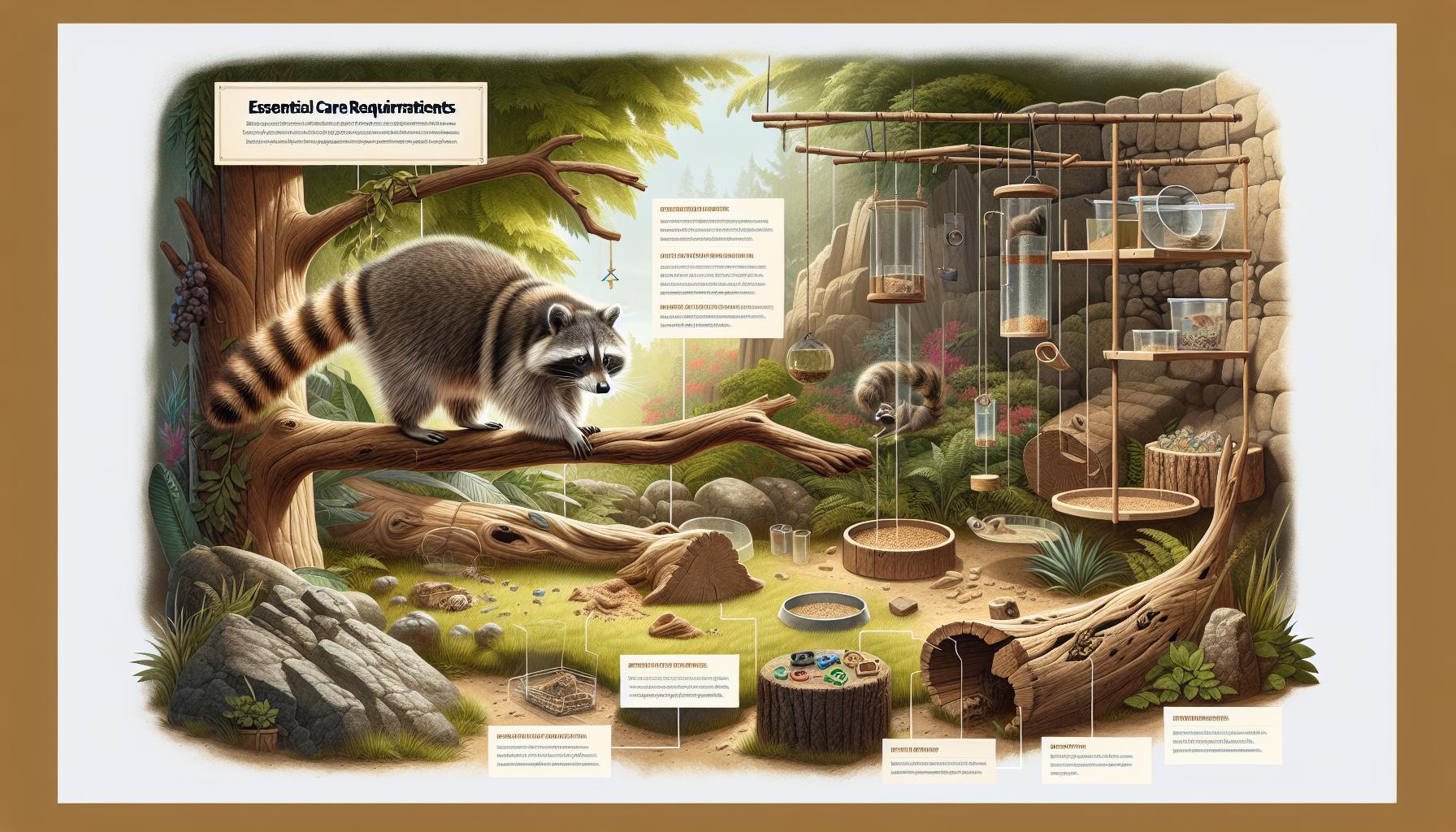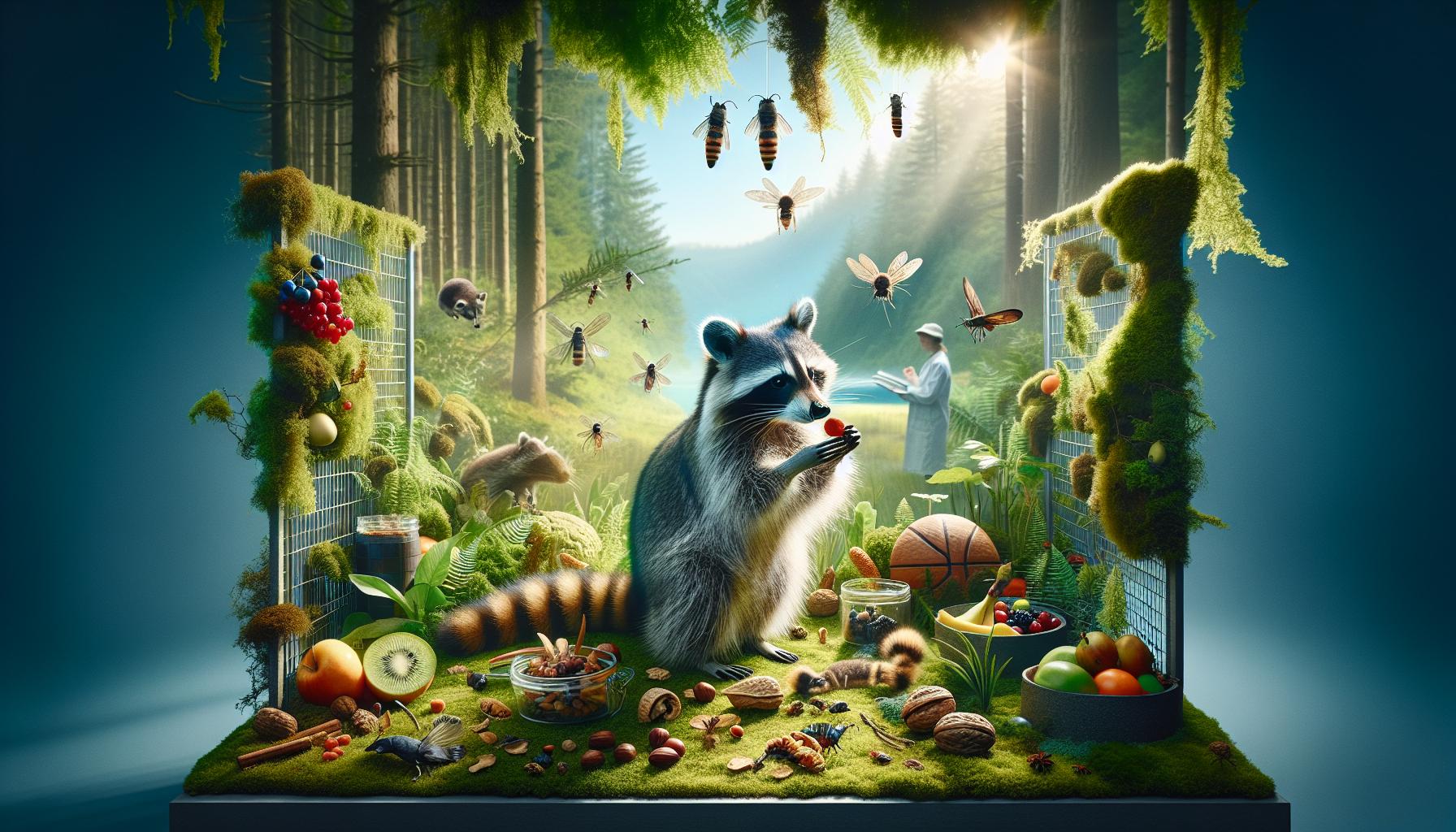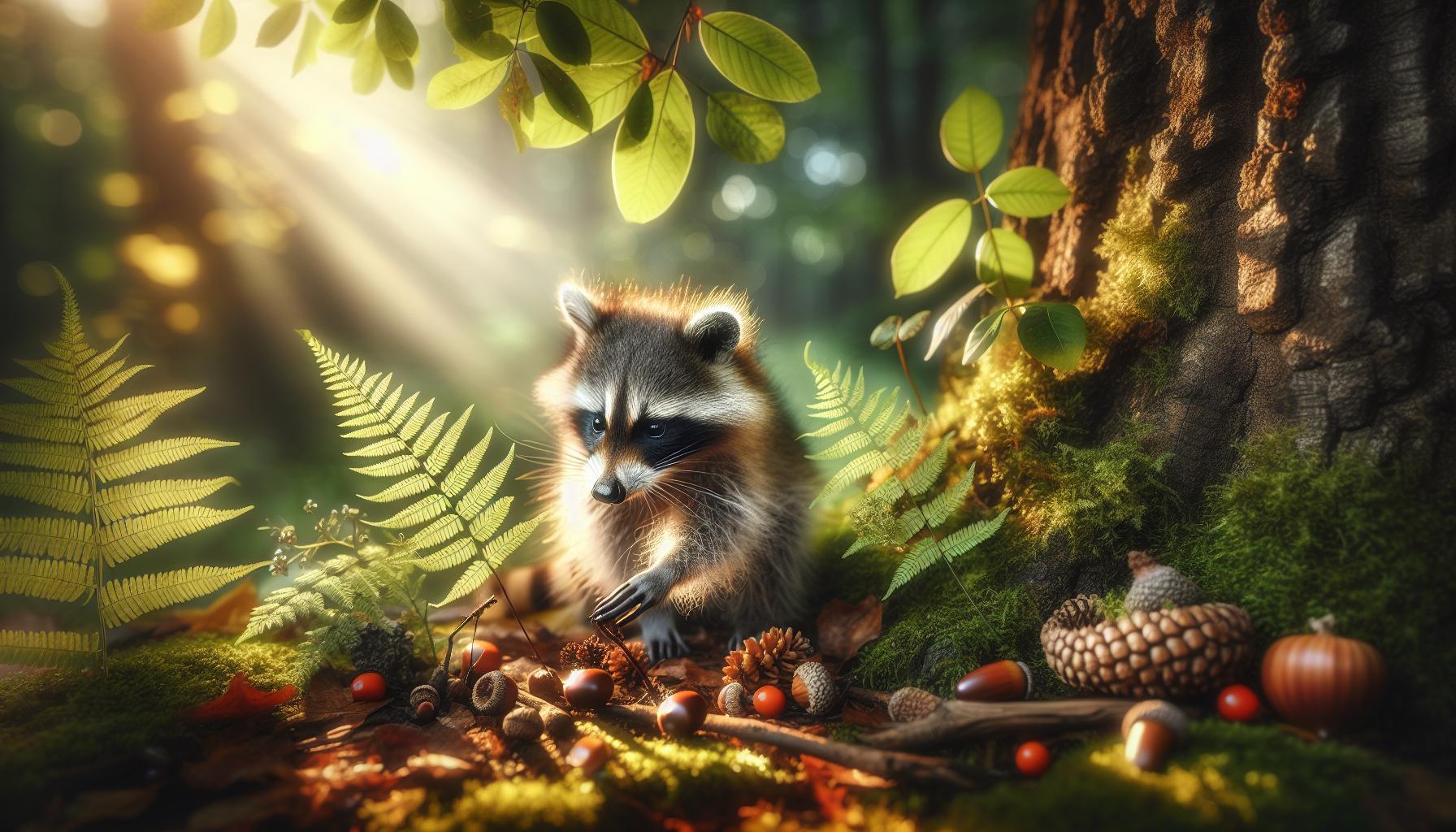Raccoons, with their playful demeanor and intelligent expressions, often capture our hearts, leading many to wonder if they can be kept as pets. While their curiosity and adaptability make them fascinating companions, potential owners need to navigate a landscape filled with unique challenges and considerations. Understanding the intricacies of raccoon care, their behavioral needs, and local regulations is crucial for anyone contemplating life with these spirited creatures. This guide delves into essential insights about raccoons as pets, helping you make an informed decision about whether these remarkable animals are the right fit for your home. Discover what it truly means to care for a raccoon and how to enrich both your lives if you choose this unconventional path.
Contents
- 1 Choosing a Raccoon as a Pet: What You Should Know
- 2 Understanding Raccoon Behavior: Social Needs and More
- 3 Legal Considerations for Keeping Raccoons as Pets
- 4 Essential Care Requirements for Pet Raccoons
- 5 Feeding Your Raccoon: Nutritional Needs Explained
- 6 Creating a Safe and Stimulating Environment
- 7 Common Health Issues in Pet Raccoons
- 8 Training Techniques for Raccoon Companions
- 9 Socializing Your Raccoon: Tips for Success
- 10 The Benefits and Challenges of Raccoon Ownership
- 11 Ethical Considerations of Keeping Raccoons as Pets
- 12 Frequently Asked Questions
- 13 To Wrap It Up
Choosing a Raccoon as a Pet: What You Should Know
Choosing to welcome a raccoon into your home as a pet is a decision that should be approached with careful consideration and understanding of the species. Raccoons are not typical domestic animals; they are wild creatures with specific social, dietary, and environmental needs. Fascinatingly intelligent and highly curious, raccoons possess unique cognitive abilities that are often underestimated. However, their wild instincts and behaviors can lead to challenges that potential owners must be ready to address.
Before taking the plunge, it is essential to recognize that raccoons are social animals that thrive on interaction and stimulation. They require considerable attention and engagement, as isolation can lead to behavioral issues such as excessive noise, aggression, or destructive tendencies. A typical raccoon can live up to 15 years in captivity and can grow to weigh between 8 to 20 pounds. Therefore, prospective pet owners should ensure they can commit to a long-term relationship with these dynamic animals. This includes providing consistent socialization and enrichment to keep their active minds engaged.
When considering a raccoon as a pet, prospective owners should also be aware of their legal status. In many regions, keeping a raccoon as a pet is subject to regulations or outright bans, necessitating thorough research into local laws. In addition, potential owners should seek out reputable breeders or rescue organizations that adhere to ethical breeding practices, ensuring the health and welfare of the animals.
Beyond legal and social considerations, the commitment to proper care is paramount. Raccoons require a specific diet rich in protein, fruits, and vegetables, along with fresh water. Their living environment should mimic a natural setting with space for climbing, exploring, and hiding. Meeting the physical and emotional needs of a raccoon can be demanding, stressing the importance of fully understanding what it entails to integrate such an animal into your life. By approaching this decision with the right information and mindset, you can create a fulfilling and responsible partnership with this intriguing creature.
Understanding Raccoon Behavior: Social Needs and More
Understanding the intricacies of raccoon behavior is crucial for anyone considering these intelligent and playful creatures as pets. Raccoons are not just cute faces; they are highly social beings that thrive on interaction and engagement. In the wild, they live in family groups, often working together to forage and play. This social nature means that raccoons kept as pets require substantial interaction with their human companions to remain happy and healthy. A raccoon left alone for extended periods can develop anxiety and behavioral issues, reflecting their need for companionship and stimulation.
Given their natural curiosity and intelligence, raccoons need an enriching environment that mimics their wild habitat. This goes beyond simple toys; raccoons are explorers that require mental challenges to keep them engaged. Activities such as puzzle feeders can provide not only nutritional benefits but also exercise their problem-solving abilities. Additionally, raccoons enjoy climbing and digging, so creating a safe space with vertical structures and hiding spots can cater to their instinctual behaviors. Without these outlets, boredom can lead to destructive behaviors, such as tearing apart furniture or incessantly digging.
The social needs of a raccoon extend beyond just human interaction. Ideally, they benefit from companionship with other raccoons. However, if that’s not feasible, owners should be prepared to invest considerable time in socializing with their pet. Regular playtime and training can help build a strong bond between the raccoon and its owner while providing essential behavioral guidance. Understanding the specific vocalizations and body language of raccoons can further enhance communication, helping owners interpret their needs and emotions effectively.
In conclusion, keeping a raccoon as a pet is a rewarding yet challenging endeavor. Their social and mental needs require an owner who is committed and knowledgeable about the species. By creating an engaging and interactive environment, prospective pet owners can foster a happy and healthy relationship with these fascinating animals, ultimately making their companionship a source of joy for both parties.
Legal Considerations for Keeping Raccoons as Pets
Keeping a raccoon as a pet can be a captivating adventure, but it comes with a set of legal hurdles that potential owners must navigate. Many people are unaware that raccoons are classified as wild animals and not domesticated pets. This distinction often translates into varying regulations regarding their ownership, which can change depending on your location. In some states or municipalities, raccoons may be completely banned as pets, while in others, a permit or special license may be required.
Before deciding to bring a raccoon into your home, it’s crucial to conduct thorough research on local laws and regulations. Depending on where you live, you might need to check with wildlife agencies, state departments, or local animal control offices to understand the legality of raccoon ownership. Some regions may allow ownership but require specific enclosures or care provisions to ensure the welfare of the animal and the safety of the community. Failing to comply with these laws can lead to hefty fines, confiscation of the raccoon, or even legal action.
It’s equally important to consider the ethical implications of adopting a wild animal. While raccoons can become familiar and affectionate with their human caregivers, their wild instincts remain intact, which can lead to unpredictable behavior. Moreover, raccoons might carry diseases, such as rabies, which can pose a risk to human health. As such, legal considerations also encompass public health concerns and the potential impact on local ecosystems if raccoons were to escape or be released into the wild.
To aid in responsible ownership, potential raccoon owners can seek out educational resources, connect with local wildlife rehabilitators, or join support groups of experienced raccoon owners. These avenues can provide valuable insights into the legal landscape and best practices for care. Understanding the ramifications of owning a raccoon goes beyond simply navigating laws; it’s about fostering a sustainable and ethical relationship with a fascinating yet wild creature.
Essential Care Requirements for Pet Raccoons
Caring for a raccoon can be an enchanting yet demanding endeavor. Known for their cleverness and playful antics, raccoons are captivating creatures. However, their needs are complex and require dedicated attention and resources from their owners. To successfully welcome a raccoon into your home, understanding their essential care requirements is vital.
Housing and Environment
Creating a suitable living space is paramount for the health and happiness of your pet raccoon. Raccoons are natural climbers and explorers, so their enclosure should be spacious, sturdy, and equipped with climbing structures. A secure outdoor enclosure is ideal, but it must be escape-proof as raccoons are known for their dexterity and problem-solving skills. Include various enrichment items, such as tunnels, ropes, and boxes, to keep them mentally stimulated. If indoors, allocate a dedicated room where they can roam safely, free from hazards.
Socialization Needs
Raccoons are inherently social animals, thriving on interaction not only with humans but also with other raccoons. It’s essential to engage with them daily, providing ample opportunities for play and bonding. However, be aware that, despite their playful demeanor, they possess strong wild instincts. Understanding their body language and behaviors is crucial in preventing misunderstandings that could lead to aggressive responses. Gradually socializing your raccoon can help reduce anxiety and build trust.
Nutritional Requirements
A well-balanced diet is fundamental to your raccoon’s well-being. Unlike typical pets, raccoons are omnivorous, meaning they need a variety of foods. Their diet should consist of high-quality commercial raccoon food, supplemented with fruits, vegetables, cooked meats, and some grains. Avoid feeding them processed human foods, especially those high in sugar or salt, as these can lead to obesity and health issues. Regularly consult a veterinarian with experience in exotic or wildlife care for specific dietary guidance.
Health Care
Routine veterinary care is essential for mitigating health risks associated with raccoons, including veterinary check-ups, vaccinations, and preventive treatments for parasites. Raccoons can carry zoonotic diseases, and regular health monitoring can catch potential issues early. Building a relationship with a vet familiar with raccoons can make a significant difference in managing their health.
By taking these essential care requirements into account, prospective raccoon owners can ensure a safer and more fulfilling environment for both their pet and themselves. Ultimately, sharing your home with a raccoon can be a rewarding experience filled with moments of wonder and connection, provided you are prepared for the responsibility it entails.
Feeding Your Raccoon: Nutritional Needs Explained
Raccoons are fascinating creatures, known for their intelligence and adaptability. These nocturnal omnivores require a diet that not only sustains their health but also stimulates their natural behaviors. A well-rounded nutritional plan is crucial, as improper feeding can lead to serious health issues, including obesity and nutritional deficiencies. Understanding and meeting these dietary needs is key to a thriving and happy pet raccoon.
To ensure optimal health, a raccoon’s diet should consist of a variety of foods. Start with high-quality commercial raccoon food, specifically formulated to meet their unique nutritional needs. This should make up the bulk of their diet. Supplement this base with fresh fruits (like apples and berries), vegetables (such as carrots and squash), and cooked meats to provide essential vitamins and proteins. Grains can also be included in moderation. Avoid processed human foods, especially those that are high in sugar or salt, as these can disrupt their metabolism and cause weight gain.
It’s also essential to provide a source of fresh water at all times. Raccoons can be quite curious and may even enjoy playing with their water, so ensure any water containers are sturdy enough to withstand their explorative behavior. Another aspect to consider is the timing and method of feeding; raccoons often benefit from multiple small meals throughout the day instead of one large feeding. This mimics their natural foraging behavior and keeps them mentally stimulated.
Regular consultations with a veterinarian who specializes in exotic pets will further enhance your ability to provide a balanced diet for your raccoon. They can offer tailored advice, taking into account your raccoon’s age, weight, and overall health, ensuring they remain healthy and vibrant companions. By prioritizing their nutritional needs and maintaining a consistent feeding regimen, you can safeguard their well-being and enrich their lives, fostering the strong bond between you and your pet raccoon.
Creating a Safe and Stimulating Environment
Creating a comfortable and engaging space for a pet raccoon is essential to their well-being and happiness. These intelligent creatures are known for their explorative nature and need environments that challenge their problem-solving abilities while ensuring their safety. A well-designed habitat can provide mental stimulation and an outlet for their natural behaviors, mimicking their wild habitats to promote healthy attitudes and habits.
Begin with a secure living area that allows for exploration and play. A large, properly constructed enclosure will facilitate movement and activities. It should have adequate height, as raccoons are excellent climbers. Incorporate vertical space using shelves or branches, giving them opportunities for climbing and jumping, which are vital for their physical health. Use sturdy materials, ensuring there are no small openings that could lead to escapes or injuries.
Enrichment Activities
To stimulate their minds, include various enrichment activities and toys. Raccoons enjoy manipulating objects, so consider providing items like:
- Interactive feeders: These can engage their problem-solving skills while making mealtime more challenging.
- Toys: Durable toys that can withstand chewing and pawing are a great way to keep them entertained.
- Digging boxes: Fill boxes with safe sand or soil where they can dig and explore, satisfying their natural instinct to forage.
In addition to physical items, stimulate their environment with changes and rotations of toys and activities regularly. This variation helps maintain their interest and prevents boredom.
Secure Outdoor Areas
If possible, provide a safe outdoor area where your raccoon can experience fresh air and natural sunlight. Whether in a secure yard or an enclosed area, ensure that this space is free from hazards such as toxic plants, small openings, or dangerous predators. Supervise their time outdoors to prevent escapes and to manage their curious tendencies.
Lastly, consider their social needs. Raccoons thrive on social interaction, whether with their human companions or other animals. Engaging in regular play and providing companionship fosters strong bonds and helps combat behavioral issues linked to isolation.
Creating a safe, enriching environment not only enhances your raccoon’s quality of life but also strengthens the connection between the two of you. Balancing their natural instincts with secure living conditions is fundamental to happy raccoon ownership.
Common Health Issues in Pet Raccoons
Raccoons, known for their cleverness and adaptability, can face various health challenges that every prospective owner should be aware of. From infectious diseases to nutritional deficiencies, understanding these common health issues can empower you to provide the best care for your pet raccoon. For instance, raccoons are susceptible to certain conditions similar to dogs and cats, but they also exhibit unique health problems due to their wild ancestry and specific dietary needs.
One of the most prevalent health issues in pet raccoons is obesity, a concern that arises primarily from improper diet and lack of exercise. Raccoons have high metabolism and energy levels, necessitating a carefully balanced diet combined with ample physical activity. Owners should provide a diet rich in protein, fruits, and vegetables while avoiding high-fat or processed foods. Regular playtime and stimulating activities are essential to prevent obesity and its associated health risks, such as diabetes.
Raccoons are also susceptible to a range of infectious diseases, including rabies, distemper, and leptospirosis. It’s essential for owners to maintain a vaccination schedule in consultation with a veterinarian familiar with exotic pets. Regular veterinary check-ups will help identify any emerging health issues early, such as dental disease, which is common in raccoons due to their propensity for chewing and handling objects.
Moreover, behavioral problems can manifest from untreated health issues or inadequate socialization, leading to stress and anxiety in these intelligent creatures. Symptoms of potential health problems can often be seen in changes in behavior, appetite, or activity levels. Being observant and proactive in seeking veterinary advice will ensure a healthier, happier companion.
By understanding these health issues, you can take preventive measures, ensuring a long and comfortable life for your pet raccoon while enhancing the bond between you and your furry friend. Regular monitoring, a proper diet, and ongoing veterinary care are critical elements in nurturing their unique needs and addressing potential health challenges effectively.
Training Techniques for Raccoon Companions
Engaging a raccoon in training can be a delightful challenge, as these animals are not only incredibly intelligent but also exhibit a remarkable capacity for learning and interaction. Harnessing their natural curiosity and problem-solving ability is key to successful training. By using positive reinforcement techniques, owners can teach their raccoon companions a variety of behaviors that enhance their bond and create a harmonious living environment.
To start training effectively, it’s essential to establish a method that prioritizes rewards over punishment. Raccoons respond well to treats-think small pieces of fruit, nuts, or specially formulated pet snacks. When your raccoon successfully performs a desired behavior, immediately reward it with a treat and plenty of praise. This practice not only reinforces the behavior but reflects the positive relationship between the animal and owner. Consistency is critical; regular practice helps solidify learning and builds the raccoon’s confidence.
Basic Commands and Tricks
Begin with simple commands such as “sit,” “stay,” or “come.” Here’s how to teach the “sit” command:
As they get the hang of it, gradually increase the difficulty by removing immediate rewards and introducing more complex tricks like “high-five” or “roll over.”
Socialization and Obedience
Raccoons are social animals and thrive in a setting that encourages interaction. Regularly exposing your raccoon to various environments, people, and other animals promotes socialization and reduces fear-based behaviors. This process can be gradual; start by introducing them to quiet environments, and as they grow comfortable, gradually expose them to noisier settings or different animals. Always monitor their reactions and provide encouragement.
An additional benefit of training is the establishment of boundaries appropriate for living with humans. Skills such as learning where to play, what items to avoid, and how to interact with household members are essential for a well-adjusted raccoon.
Training can be a rewarding journey filled with joyful moments of growth and understanding. By investing time and patience into this endeavor, you’re not just teaching your raccoon how to respond to commands; you’re crafting a lifelong companionship based on mutual respect and affection.
Socializing Your Raccoon: Tips for Success
Raccoons are fascinating creatures known for their intelligence, dexterity, and social nature. To successfully socialize a pet raccoon, understanding their intrinsic behaviors and natural instincts is essential. These animals thrive on interaction and stimulation, and early exposure to a variety of environments and stimuli can significantly enhance their adaptability and reduce anxiety later on.
To begin with, start slow. Introduce your raccoon to quieter areas of your home or yard, allowing them to explore at their own pace. Gradually increase exposure to bustling environments and unfamiliar sights and sounds. This could include short trips in a secure carrier, supervised visits to family gatherings, or gentle introductions to other pets. Pay attention to their body language, as signs of fear such as a tucked tail or hiding may indicate they need more time in a familiar environment before venturing out again.
Routine playtime is also a key aspect of socialization. Schedule regular engaging activities that allow your raccoon to express their playful nature. Activities might include puzzle toys filled with treats, hide-and-seek games within your home, or interactive sessions with you and safe household items. Rotating toys keeps these curious animals stimulated and enthusiastic about interaction, ensuring that boredom-which can lead to destructive behaviors-remains at bay.
It’s important to remember that raccoons are inherently curious. They often investigate new environments by touching and exploring, which is a natural part of their behavior. Encourage this by creating a safe, enriching environment filled with climbing structures, tunnels, and toys that mimic their wild play behaviors. This can help them feel secure and confident, laying a foundation for successful interactions with humans and other animals.
In addition, fostering positive associations through frequent, gentle interactions can solidify your bond with your raccoon. Techniques such as offering treats during handling or engaging in quiet, calming activities like brushing can help them associate human contact with pleasure rather than fear. Regular socialization not only enhances their psychological well-being but also prepares your raccoon to be a well-adjusted companion, ultimately enriching your shared experiences.
The Benefits and Challenges of Raccoon Ownership
Owning a raccoon can be both exhilarating and daunting, offering a unique blend of companionship and challenges. These creatures are extraordinary due to their intelligence and playful nature, often displaying quirky behaviors that endear them to their owners. Raccoons can form strong bonds with humans and, when properly socialized, often exhibit affectionate behaviors, making them intriguing companions that can bring joy and entertainment to a household.
However, the delightful aspects of raccoon ownership come with notable challenges. Raccoons are inherently wild animals, and their instinctive behaviors can pose difficulties in domestic settings. They require an enriched environment, similar to their natural habitat, which can be demanding to maintain. Without adequate stimulation and social interaction, raccoons may resort to destructive behaviors, including rummaging through household items or escaping from enclosures. Additionally, they are nocturnal by nature, often leading to sleepless nights for owners due to their active night-time antics.
Another significant consideration is the legal aspect of owning a raccoon. Regulations regarding pet ownership vary widely from state to state and even city to city. Many places require special permits or may even prohibit keeping raccoons as pets altogether due to public safety concerns, potential for disease transmission, and the challenges of managing a wild animal’s behavior. It’s crucial for potential owners to thoroughly research local laws and to consider the ethical implications of keeping a wild creature in captivity.
In terms of care, raccoons necessitate a specialized diet, health check-ups, and ample space to roam and explore. Their feeding habits can often lead to dietary challenges, requiring owners to be well-informed about nutritional needs, as raccoons are omnivorous creatures. Socializing a raccoon also demands patience and time, as these animals thrive on interaction and mental stimulation. Ensuring that potential owners understand both is essential to promote responsible pet care and foster a healthy, enriching environment for these unique animals.
Ethical Considerations of Keeping Raccoons as Pets
Keeping a raccoon as a pet raises significant ethical concerns that warrant careful consideration. Raccoons are wild animals, replete with instincts and behaviors that are not easily reconciled with the constraints of domestic life. These creatures are naturally curious and highly intelligent, exhibiting behaviors shaped by their evolution as foragers in the wild. When brought into a home setting, this instinctual behavior can lead to stress, unhappiness, and behavioral issues for both the animal and the owner. Understanding these aspects is not just about legality but about the well-being of the animal.
One of the most pressing ethical dilemmas is the natural habitat requirement of raccoons. They thrive in environments that provide a rich tapestry of interaction, exploration, and stimulation. Owners must recreate this environment through a combination of mental challenges and physical space, which can often prove challenging and costly. Neglecting the environmental needs of a raccoon could lead to destructive behaviors, not just toward household items but also regarding their own health and emotional stability. Effective care is a commitment that involves more than feeding and shelter; it requires designing a lifestyle that closely mimics their natural surroundings.
Moreover, the legality of raccoon ownership is also intrinsically tied to ethical considerations. In many regions, laws exist not just to regulate but to protect the animal, the owner, and the general public. Potential owners must be aware that many places either restrict or completely prohibit the keeping of raccoons due to their wild nature and the potential for disease transmission, such as rabies. Owners should reflect on whether possessing a wild animal aligns with their values concerning species conservation and animal rights. Engaging with a wild animal, even with the best intentions, often poses dilemmas about animal welfare that cannot be overlooked.
In fostering a deep appreciation for wildlife, it is crucial to evaluate the reasons one might wish to keep a raccoon as a pet. Emphasizing responsible stewardship over ownership can lead to a richer understanding of these fascinating creatures. For many, observing raccoons in their natural habitats provides a unique opportunity to appreciate their quirks without the ethical burdens associated with ownership. By choosing to protect and appreciate wildlife rather than domesticate it, we can advocate for a more ethical interaction with the animal kingdom that honors their wild spirit.
Frequently Asked Questions
Q: Can raccoons be domesticated?
A: Raccoons are not truly domesticated animals; they are wild creatures with complex behaviors. While they can form bonds with humans, their instincts and social needs can make them challenging companions. Consider adopting a more typical domesticated pet if you’re seeking a low-maintenance companion.
Q: What diseases can raccoons carry?
A: Raccoons can carry various diseases, including rabies, leptospirosis, and raccoon roundworm. It’s crucial to keep them vaccinated and regularly checked by a veterinarian to minimize health risks to you and other pets. Ensure you read about common health issues in pet raccoons for more information.
Q: Is it legal to keep a raccoon as a pet?
A: The legality of keeping raccoons as pets varies by state and country. Some places require specific permits, while others may ban ownership altogether. Check local laws and regulations before considering a raccoon as a pet to ensure compliance and avoid legal issues.
Q: How much space does a pet raccoon need?
A: Raccoons are active and curious animals that require a spacious, stimulating environment to thrive. Provide a secure outdoor enclosure with climbing structures and enough room to roam safely. Surroundings should replicate their natural habitat to prevent boredom and destructive behaviors.
Q: What do raccoons eat as pets?
A: Pet raccoons require a balanced diet that includes high-quality cat or dog food, fruits, vegetables, and occasional protein sources like cooked eggs or lean meat. Avoid feeding them processed or sugary foods. For specific nutrition tips, refer to the feeding section in your care guide.
Q: How do you train a raccoon?
A: Training a raccoon involves patience and positive reinforcement. Use treats to reward desired behaviors and establish a routine. Consistent commands can help with basic training, but remember to cater to their natural instincts. Explore training techniques in dedicated resources for further insights.
Q: Can you leave a raccoon alone during the day?
A: While some raccoons can tolerate being alone for short periods, they are social creatures that need attention and companionship. Leaving them alone for extended hours can lead to stress and behavioral issues. Consider adopting more than one raccoon for social interaction.
Q: What should I consider before getting a raccoon as a pet?
A: Before adopting a raccoon, assess your lifestyle, legal requirements, and commitment to their care. Raccoons demand significant time, attention, and resources. Review information on ethical considerations and challenges of ownership to make an informed decision.
To Wrap It Up
As we conclude our exploration of whether raccoons can make suitable pets, remember that while their charm and intelligence are undeniable, responsible ownership is key. Ensure you weigh the pros and cons carefully before making a decision. Interested in more fascinating wildlife insights? Check out our articles on “Caring for Exotic Pets” and “Understanding Animal Behavior” for deeper dives into pet care and management.
If you found this information helpful, consider subscribing to our newsletter for the latest updates on pet care and wildlife insights. Your journey into understanding the needs and behaviors of animals doesn’t have to end here. Share your thoughts or questions in the comments below, and join the conversation about responsible pet ownership. Explore further, and take the next step in becoming a knowledgeable and compassionate guardian of your future pets!





